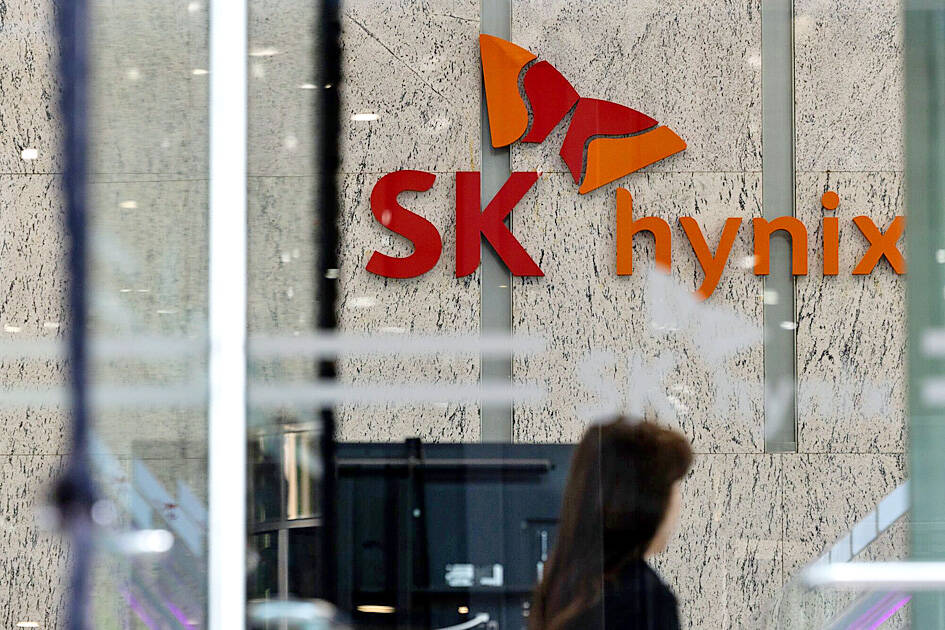South Korea’s SK Hynix Inc, the world’s No. 2 memorychip maker, is to invest 103 trillion won (US$74.6 billion) through 2028 to strengthen its chips business, focusing on artificial intelligence (AI), its parent SK Group said yesterday.
SK Group also said it plans to secure 80 trillion won by 2026 to invest in AI and semiconductors as well as fund shareholder returns, while streamlining its more than 175 subsidiaries.
The sprawling conglomerate outlined the plans following a two-day strategy meeting, aiming to revive the group after SK Hynix, its main money maker, and the group’s electric vehicle battery arm suffered heavy losses.

Photo: Bloomberg
SK Group said it sought to improve its competitiveness by focusing on its AI value chain, including high bandwidth memory chips, AI data centers and AI services such as personalized AI assistants.
At a time of transition, a “preemptive and fundamental change is necessary,” SK Group chairman Chey Tae-won was quoted as saying in the statement
During the meeting, the executives also agreed to take gradual steps to adjust the number of subsidiaries in the group to a “manageable range,” without specifying the scale of the reduction.
Local media had said SK Innovation Co, which owns the country’s largest oil refiner and battery maker SK On Co, was expected to pursue a merger with profitable gas affiliate SK E&S Co.
The group expects its profit before tax to reach about 22 trillion won this year, turning around from a loss last year, with the goal of hitting 40 trillion won in profit before tax by 2026.
South Korea, home to the world’s top memorychip makers Samsung Electronics and SK Hynix, has fallen behind some rivals in areas such as chip design and contract chip manufacturing.
Earlier this year, the government announced a 26 trillion won support package for its chip businesses, citing a need to keep up in areas like chip design and contract manufacturing amid ‘all-out warfare’ in the global semiconductor market.

Taiwan’s long-term economic competitiveness will hinge not only on national champions like Taiwan Semiconductor Manufacturing Co. (TSMC, 台積電) but also on the widespread adoption of artificial intelligence (AI) and other emerging technologies, a US-based scholar has said. At a lecture in Taipei on Tuesday, Jeffrey Ding, assistant professor of political science at the George Washington University and author of "Technology and the Rise of Great Powers," argued that historical experience shows that general-purpose technologies (GPTs) — such as electricity, computers and now AI — shape long-term economic advantages through their diffusion across the broader economy. "What really matters is not who pioneers

In a high-security Shenzhen laboratory, Chinese scientists have built what Washington has spent years trying to prevent: a prototype of a machine capable of producing the cutting-edge semiconductor chips that power artificial intelligence (AI), smartphones and weapons central to Western military dominance, Reuters has learned. Completed early this year and undergoing testing, the prototype fills nearly an entire factory floor. It was built by a team of former engineers from Dutch semiconductor giant ASML who reverse-engineered the company’s extreme ultraviolet lithography (EUV) machines, according to two people with knowledge of the project. EUV machines sit at the heart of a technological Cold

TAIWAN VALUE CHAIN: Foxtron is to fully own Luxgen following the transaction and it plans to launch a new electric model, the Foxtron Bria, in Taiwan next year Yulon Motor Co (裕隆汽車) yesterday said that its board of directors approved the disposal of its electric vehicle (EV) unit, Luxgen Motor Co (納智捷汽車), to Foxtron Vehicle Technologies Co (鴻華先進) for NT$787.6 million (US$24.98 million). Foxtron, a half-half joint venture between Yulon affiliate Hua-Chuang Automobile Information Technical Center Co (華創車電) and Hon Hai Precision Industry Co (鴻海精密), expects to wrap up the deal in the first quarter of next year. Foxtron would fully own Luxgen following the transaction, including five car distributing companies, outlets and all employees. The deal is subject to the approval of the Fair Trade Commission, Foxtron said. “Foxtron will be

INFLATION CONSIDERATION: The BOJ governor said that it would ‘keep making appropriate decisions’ and would adjust depending on the economy and prices The Bank of Japan (BOJ) yesterday raised its benchmark interest rate to the highest in 30 years and said more increases are in the pipeline if conditions allow, in a sign of growing conviction that it can attain the stable inflation target it has pursued for more than a decade. Bank of Japan Governor Kazuo Ueda’s policy board increased the rate by 0.2 percentage points to 0.75 percent, in a unanimous decision, the bank said in a statement. The central bank cited the rising likelihood of its economic outlook being realized. The rate change was expected by all 50 economists surveyed by Bloomberg. The